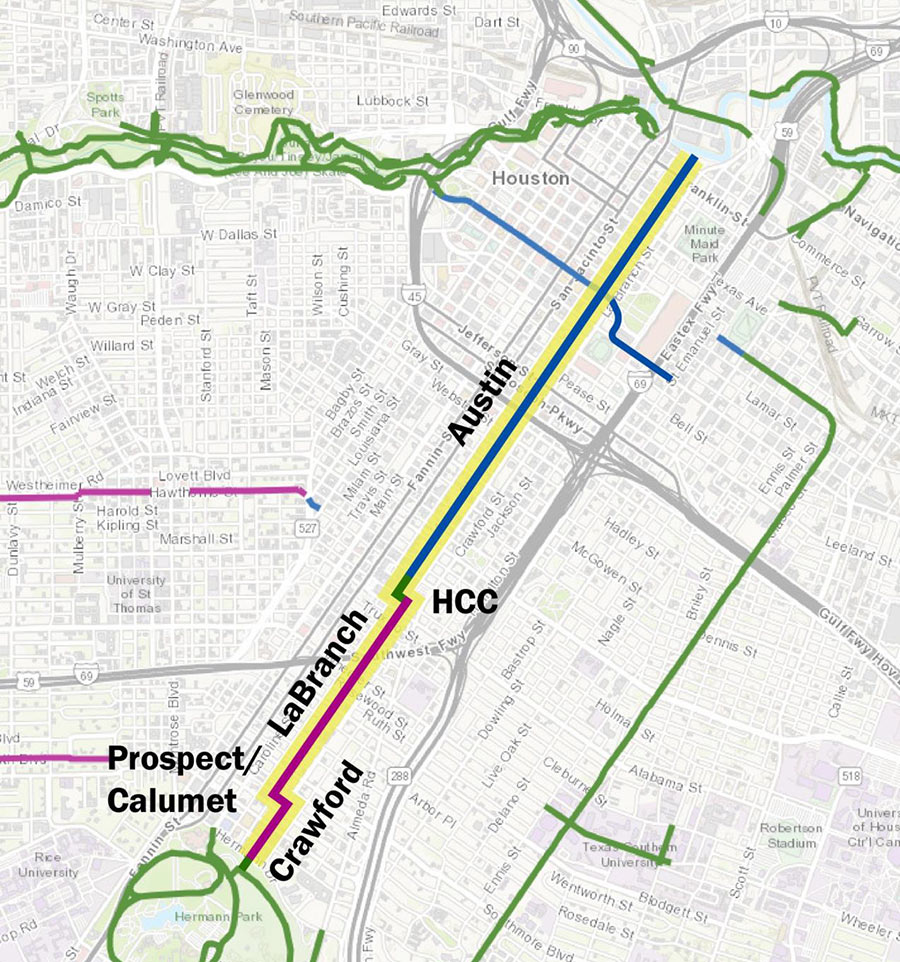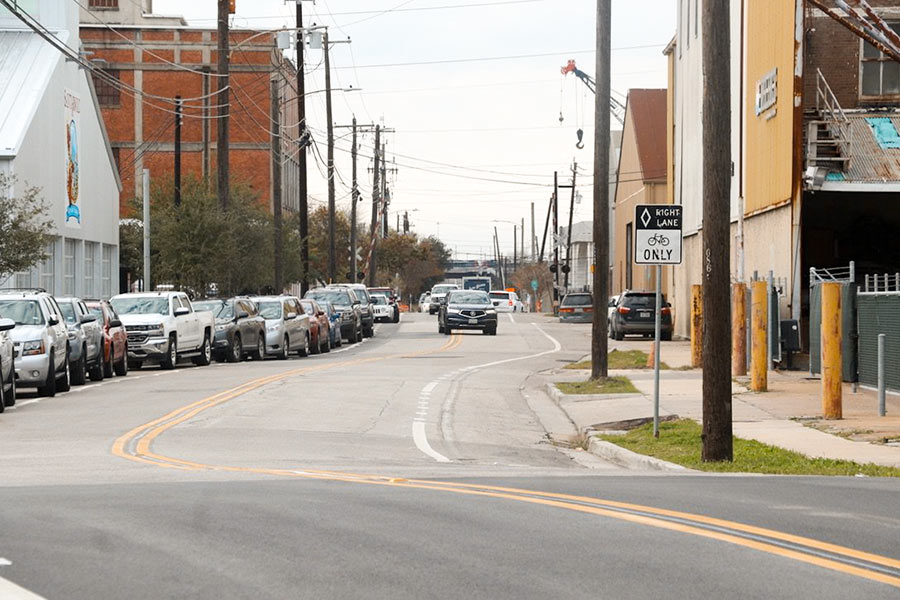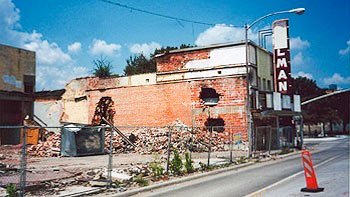THE PROP. 1 DITCH INCENTIVE If Houston voters pass Proposition 1 in November, the average homeowner will pay about $5 a month to the city’s new drainage and street-renewal fund, Mayor Parker announced today. Commercial properties and homes on curb-and-gutter streets would be assessed 3.2 cents per sq. ft. of hardscape (including building footprints, driveways, porches and parking lots) per year. But owners who live on streets with open ditches would only have to pay at a 2.6-cents-per-sq.-ft. rate. That’d save the average ditch-side homeowner a whopping $11.40 a year. The assessment rate would be fixed for 10 years, and require a two-thirds vote from city council to be raised after that. Reporter Miya Shay has the calculations. [abc13; previously on Swamplot]




Also add that at the 19 year point, the whole concept goes into sunset and the city council will have to re-authorize it. If enacted, we will definitely know if it works by then and the public an lobby to keep or dismantle it. Hopefully the public is involved.
Permit.. fee.. taxes.. fund..
We never really own our property.. we just rent it from the gov’t.. thanks.
If Renew Houston and supporters were honest in calling it a Tax, then they’ll have to truly defend it.
Anything you pay to government (whether it water bill or a parking meter) is a tax. You can call it all kinds of things. In then end, it’s a tax.
I’ve argued with people from the Renew Houston campaign over this point. They are quick to say it’s not a tax. Sadly, they are so wrong.
I see the benefits in what they are proposing and how long term it could spare the city from having a debt service for road and drainage repairs. I still haven’t decided if I’ll vote for it though.
Water bills aren’t a tax, they are a fee for service. Same thing for municipalities that have their own power systems.
I guess there are even more condos than I thought in Houston. Because at the 2.6 cents rate (if my math is correct) my 2,777 sqft residential lot will cost me ~$6.02/month. Obviously (or not apparently), this is a very small lot, especially by Houston standards. I can stretch my arms across my whole “backyard.” Seems like the majority of homeowners I know will be paying well over $5/month.
Under this plan all of the upper-middle class condo/townhouse yuppies will get to pay FAR less than their neighbors who live in 100 year old “tear-downs” in the 5th ward. Great tax policy!
btw, I live in one of those nice “almost-a-townhouse” so I support this plan 100%. This will be far cheaper for me than if the city were to use general funds to make the much needed improvements, since those come from my property taxes which are based on the value of my house. I could get behind this whole regressive tax thing! :)
Actually urbanmaid, you will only pay $6.02 if the whole of your lot is hardscape. An owner of a 5th ward home with a significant softscaped area would pay proportionally less. For example a 1500 sq ft bungalow on a 6600 sq ft lot with no driveway would pay $3.25 per month. Or have I got it all wrong?
@kjb434
Will they be filling in our ditches and widening the streets in Cottage Grove with this effort?
Can Ainbinder just build something in my ditch so I don’t have to pay this? I thought that’s how we paid for things these days…InTown Homes? Can you pay for this?
What a scam. They won’t fix a thing about the drainage… probably make it worse.
So how are they going to determine hardscape percentages? Aerial imagery analysis? Surely, they aren’t going to send someone out to every property to measure how much hardscape they have? Also will it be updated annually… what if I put a patio in my backyard or new driveway after this goes into effect. Sounds like a bureaucratic cluster to me. Or maybe the designers didn’t think this whole thing through and now they are trying to play catch up to make it more fair.
So many questions, I hope they publicize more info before this goes to a vote.
Since I like to double post… my next thought:
My house is pier and beam in the Heights so technically my house footprint isn’t “hardscape” except at a few small points and the remainder is still pervious. Wonder if they thought about that one in the verbage? :)
I’m beginning to worry that the cost of setting up and administering this program will exceed the revenue it will generate.
Perhaps if I had clicked on the link I would have gotten some of my questions answered…
“Open ditch street: PRI number x 1.38 x .026 = yearly fee. Divide that by 12 to get your monthly fee ”
So it’s “the base area of your house” x “a general assumption of how much other impervious space you have” x “rate”
This makes more sense, though it still doesn’t seem very fair; but hey with my configuration (narrow and vertical) if it passes I won’t complain about the impact on me.
With the assumptions, I pay less than I thought, given we have a 900 sq ft detached garage and 1200 sq ft of driveway. The City fudge factor of 1.38 times PRI comes out to 1000 sq ft less than we really have.
a big NO for me.
if you want to pay for it make it come out of property taxes. there’s absolutely no need to set up new fees for these kind of expenditures. that means a lot more administrative costs to collect and distribute that should be handled through existing channels. if you want to raise taxes (which i fully support), then say it for christsakes. don’t beat around the bush with this crap.
If you really believe this is only going to cost $5 a month you need to put the crack pipe down! This is just another raise in taxes by our new Mayor.
Billy,
To be honest, the mayor has no role in this and didn’t expressly support the measure. A separate group of engineers and developers pushed this initiative and got the signatures to put it on the ballot for the public to vote. Only one council member (Steve Costello) has been directly supportive and campaigning for the measure. Everyone else on city council and the mayor has steered clear of the issue because the last time a similar measure was proposed in 2004 it went down in flames.
Joel, I’m sure they’ll bundle this fee in with another utility or tax. I don’t think they will set up separate administrative procedures to collect $5 or $60 a year.
Does anyone know how much they want to raise in this “fund” ? Or how much in short-term expenses the City will owe in drainage and street repairs?
I really dislike how the City is talking in small, bite-size, politically expedient numbers. Can we get a sense of how much money this fund will raise? What are the projected expenses for street and drainage repair?
Jeff,
The goal is a to raise $150mil a year which is pretty much what the city has been trying to spend on road and drainage improvements. The argument goes that bond payments are eating into their current budget and they’ve been stealing money from the water utilities to fund road and drainage, but eventually the pot of money will shrink to nothing.
The concept behind the proposal is that the current city budget will be relieved of funding road and drainage and just manage the existing bond payments and the new source of funding will be dedicated “pay-as-you-go” with no future debt for these particular projects. The fund being separate from the city budget means it can’t be pilfered for other uses. I’m not a lawyer, so I can’t verify myself that the money can’t be misused on non-road and drainage projects from the wording.
A similar concept has been implemented in Louisiana on a statewide basis. The gas taxes the state received were isolated from the general budget and placed in it’s own fund to be only used for transportation uses. The state reps can’t re-appropriate the money for other uses. The difference is that the citizens were already paying the gas tax. The money just had to be isolated so it couldn’t be wasted.
kjb,
So drainage and street improvements will, essentially, start from a zero balance (rather than a debt position) and be funded with monthly cash flow from this fee? And the math works out so that this fee is in an accurate and predictable range?
I don’t know all of the politics behind a decision like this. I’m relatively new to Houston. But I do know that (1) the City Council likes to entertain big bond initiatives and talk about increasing the (already high) sales tax to cover budgetary shortfalls, even if the business case isn’t there (see: Metro), and (2) the County tries to raise my property taxes as much as they can, as often as they can.
So while this drainage/street improvement fee makes perfect sense, in light of these two realities, I understand Houstonians’ deep distrust of local government.
And I appreciate what they’ve done in Louisiana. But I don’t think isolating revenues and spending is an appropriate long term solution. I think it is far too risky.
The idea is that the first couple of years the fund will build up. There is a target fund amount that the taxes (fees which will be accessed on your water bill) generate will need to reach. The is primarily to replace and upgrade existing infrastructure. The city isn’t really in the business of installing new infrastructure. Any new public street development will occur within and in-city municipal utility district so that district will pay the cost and not the city (i.e. taxpayer). Several of these MUD’s exist already. When they pay off the streets themselves, it’ll be added to the city’s responsibilities.
Your assessment of the current state of the budget is good.
A main driver of this measure was that much of the cities expansive infrastructure was built in the late 50’s and 60’s. Roads made with concrete generally have a lifespan of 50-years. Some can and do function well for much longer. The ones that are deteriorating will need to eventually be replaced. Since roads in Houston are part of the drainage infrastructure, when a road gets reconstructed, the underground drainage components will be assessed and upgraded and replaced as needed. This is the process the city is doing currently on all its major road projects with minor streets being resurfaced with asphalt. Minor streets made of concrete generally have much longer lifespans because of lighter traffic.
The $150mil is based upon a rate of replacement and estimated construction costs. Construction costs have come down a bit so this number is a little higher, but they are sure to go back up eventually. The number can be adjusted by adjusting the fee assessed to homeowners and developers.
kjb,
Wow. That’s great detail. Thanks!
Jeff
I just wished the supporters would get into this much detail. Their presentation often leaves the voters with more questions and skepticism (rightly so).
“Taxes” or “fees”…hmmm…here’s what I pay…
$873.47 “tax” – COH’s share of my property tax bill
$7.50/mo “refuse fee” for second garbage can – COH Public Works and Engineering Department
$50.00/yr “permit” for burglar alarm – COH Alarm Permit Administration
$10.00/yr/pet “license” for 2 dogs – COH Animal Licensing Department
>$100/each “permits” for renovating my house – 5 in the past 12 months – COH Dept. Public Works and Engineering Code Enforcement
And don’t tell anyone, but out of disgust with the above I refuse to register my bicycle with COH as required by law because they charge another “FEE” of $1/bike.
This initiative is be being pushed by a select group of construction contractors as a way to guarantee work through forced funding for the next two decades. Of course, it’s being window-dressed as otherwise with ads portraying people drowning in cars and homes knee-deep in water if we don’t support it. The funny thing all the people who’ve drowned in cars that I’ve seen in the past several months have been either drinking or acting on vendettas against guardrails.
SuperDave,
You forgot the COH mandated ‘recyclable trash bags” for lawn clippings. The City approved bags are approx $0.80 to $1.00 each where your plain old plastic bag was around $0.25 each.